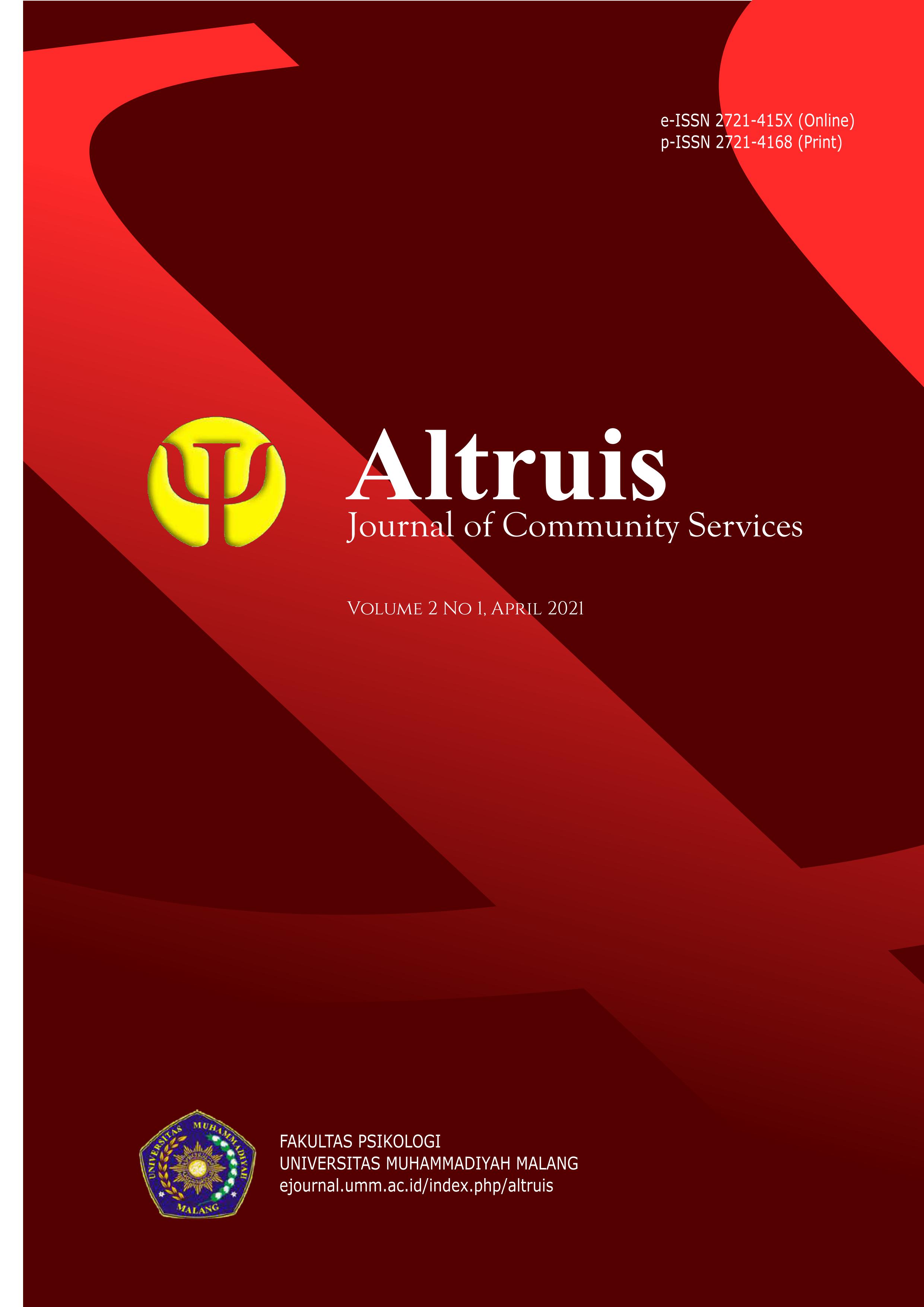Sosialisasi Aspek Psikologis yang harus dimiliki oleh Atlet dan Pelatih Bola voli
Sosialisasi Aspek Psikologis yang harus dimiliki oleh Atlet dan Pelatih Bola voli
DOI:
https://doi.org/10.22219/altruis.v2i1.15531Keywords:
psychological aspects, volleyball, athletes, coachesAbstract
The purpose of this community service is to provide knowledge to athletes and volleyball coaches about the psychological aspects that volleyball athletes must have and for coaches to be able to train these aspects in training. The community service method is carried out with a participatory educational approach through material presentation and discussion using a website seminar (webinar) using the zoom application. The material given is about the concept of psychological aspects that volleyball athletes must have and how the coach trains them. The indicator of achievement is an increase in the score of knowledge (cognitive) obtained by volleyball athletes. The instrument used was a test item test. The target of this service is non-productive people, namely 3 coaches and 6 athletes in Bantul Regency. The service was carried out on February 4, 2020. Descriptive data analysis, statistical test using the mean difference test. The results of the dedication showed that there was an increase in the mean mean of pre-test 72.22 to 82.22 post-test, an increase of 10%. Athletes' knowledge of this psychological aspect is very important to provide insight to the psychological aspects that they must master, and for the coach to be able to design exercises to develop psychological aspects for the athlete
Downloads
References
Bar-Eli, M. (2018). How the Psychology of Sports Can Enhance Your Performance in Management and Work. USA: Oxford University Press.
Bisagno, E; Morra, S; Basciano, M; Rosina, C; & Vitalli, F. (2019). Assessing Individual Performance in Team Sports: A New Method Developed in Youth Volleyball. J. Funct. Morphol. Kinesiol, 4, 53; doi:10.3390/jfmk4030053.
Fu, R. (2019). The Importance and Application of Psychological Factors Training Based on Big Data Analysis in Volleyball Teaching. 9th International Conference on Education and Management. DOI: 10.25236/icem.2019.049.
Hudson, J; & Males, J. (2006). Team Process and Players’ Psychological Responses to Failure in a National Volleyball Team. Sport Psychologist. DOI: 10.1123/tsp.20.3.275.
Mohammadzadeh, H; & Sami, S. (2014). Psychological Skills of Elite and Non-Elite Volleyball Players. Annals of Applied Sport Science, vol. 2, no. 1, pp. 31-36. ISSN (Online): 2322 – 4479.
Moreno, M.P.; Santos, J.A.; Ramos, L.A.; Cervelló, E.; Iglesias, D. & Del Villar, F. (2005). The Efficacy of the Verbal Behaviour of Volleyball Coaches During Competition 13, 55-69. MOTRICIDAD: European Journal of Human Movement.
Saemi, E; & Ghamary, A. (2011). Relationship between mental skills and anxiety interpretation in female volleyball players. STUDIES IN PHYSICAL CULTURE AND TOURISM. Vol. 18, No. 1.
Shaw, D.F; Gorely, T; & Corban, R.M. (2005). Sport and Exercise Psychology. USA: BIOS Scientific Publishers Taylor & Francis Group.
Zetou, E; Vernadakis, N; Bebetsos, E; & Makraki, E. (2012). The effect of self-talk in learning the volleyball service skill and self-efficacy improvement. JOURNAL OF HUMAN SPORT & EXERCISE. Volume 7 Issue 4. ISSN 1988-5202. doi:10.4100/jhse.2012.74.07.
Downloads
Published
How to Cite
Issue
Section
License
Copyright (c) 2021 Sujarwo Sujarwo

This work is licensed under a Creative Commons Attribution-ShareAlike 4.0 International License.
Authors who publish in Altruis agree to the following terms:
- For all articles published in Altruis, copyright is retained by the authors. Authors give permission to the publisher to announce the work with conditions. When the manuscript is accepted for publication, the authors agree to automatic transfer of the publishing right to the publisher.
- Authors retain copyright and grant the journal right of first publication with the work simultaneously licensed under a Creative Commons Attribution-ShareAlike 4.0 International License that allows others to share the work with an acknowledgment of the work's authorship and initial publication in this journal.
- Authors are able to enter into separate, additional contractual arrangements for the non-exclusive distribution of the journal's published version of the work (e.g., post it to an institutional repository or publish it in a book), with an acknowledgment of its initial publication in this journal.
- Authors are permitted and encouraged to post their work online (e.g., in institutional repositories or on their website) prior to and during the submission process, as it can lead to productive exchanges, as well as earlier and greater citation of published work (See The Effect of Open Access).
This work is licensed under a Creative Commons Attribution-ShareAlike 4.0 International License.


